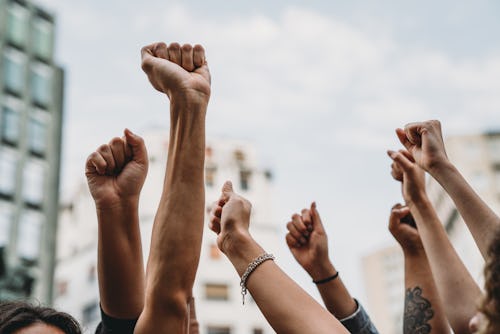Taking Action
6 Organizations Fighting Police Brutality That You Can Support Right Now
Police killed more than 1,100 people in 2022.

In 2022, police killed more than 1,100 people in the United States. This doesn’t include people who lived after violent interactions with police but still experienced beatings, tasers, mace, or abuse at their hands. There are many U.S. anti-brutality organizations that exist for the purpose of tackling this violence head-on. Through educating the public about their rights, pushing for programs that move away from policing and punishment, and observing the police, these organizations work to hold police responsible for abuses of power.
In the 19th century, the police force in the South was created as a way of maintaining enslaved people, and in the last few years, after the police killings of people such as George Floyd, Breonna Taylor, Daunte Wright, and Ma’Khia Bryant, there has been a massive call to reimagine the role of police, especially regarding systemic issues of police brutality and racial inequality. After Derek Chauvin was convicted of George Floyd’s murder in April 2021, President Joe Biden called the verdict a “too rare” step toward “basic accountability.”
So, if you’re looking to make a donation to an anti-brutality organization, get involved, or learn more about such efforts, here are six organizations you can look into.
Communities United For Police Reform
Communities United for Police Reform (CPR) is comprised of community leaders and lawyers who work to educate the public about their rights and police rights. The New York-based group focuses on holistic efforts toward community safety, rather than relying on the police to change. Donations go to “building the capacity of New Yorkers most affected by abusive and discriminatory policing.”
Anti Police-Terror Project
The Anti Police-Terror Project (APTP) is led by Black organizers who want to eliminate police brutality in communities of color. They provide support to families and connect them with resources like legal representation and counseling. Donations help provide educational resources to these communities and support these efforts.
Dream Defenders
Dream Defenders is a group of young adults determined to change the world around them. Based in Florida, the organization works to eliminate policing, prisons, and widespread surveillance systems. They aim to build better alternatives to these systems, ones that work to uplift communities rather than criminalize individuals. Donations go toward the Dream Defenders Action Fund, which provides those in need with mutual aid and financial support.
Campaign Zero
Campaign Zero is a national research organization that works to understand what “public safety beyond policing” could look like, whether via independent oversight, legal bans on the use of force, or the end of for-profit policing. It’s run by the nonprofit WeTheProtesters, and you can use its online tools and research, all of which are chock-full of stats, to understand the scale of the problem.
Mothers Against Police Brutality
Mothers Against Police Brutality (MAPB) focuses on families affected by police violence. The Texas-based organization, founded in 2013, has received recognition and donations from people such as Colin Kaepernick and Snoop Dogg. MAPB allows families to speak about their experiences with police brutality to bring awareness to the issue. Donations go toward “continu[ing the] mission of being the voice for justice for victims of police brutality, excessive force and unjust murders by law enforcement.”
Communities United Against Police Brutality
Communities United Against Police Brutality (CUAPB), which was founded in 2000 to combat police brutality in Minnesota, operates a 24-hour crisis line for people to report incidents of police violence, while also helping survivors obtain legal, psychological, and medical support.
This article was originally published on